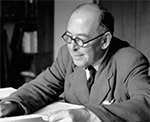
The Four Loves
"Heaven offers nothing that a
mercenary
soul can desire" (149).
C. S. Lewis's The Problem of Pain (1940)
Points for Reflection
Chapter One ("Introduction")
- Do you agree with Lewis that comfort with isolation is spiritually unhealthy (3 mid)?
- Do you agree that happiness does not necessarily correlate positively with nearness to God (5 top-bot)?
- Does our own culture encourage the error of setting up love of one's beloved, love of one's country, or love of one's family as divine--as equivalent to God himself (7 mid)?
- What does Lewis mean by the claim that loving powerfully makes us more like God, but does not necessarily draw us closer to God (8 mid)
- How should the belief that “God Is Love” (John 4:16b) shape human behavior?
- Is relationship with God strengthened more by recognizing our innate resemblance to God, or by actively imitating God?
- When are we most in danger of reversing St. John’s dictum, and wrongly concluding that love is God?
- What are the possible negative repercussions of behaving as if love is itself God?
Chapter Two ("Likes and Loves of the Sub-Human")
- Do you agree that humans are more eager to "praise and dispraise than to describe and define" (12 mid)?
- How does Lewis distinguish appreciative love from need-love and gift-love (16-17)?
- Does Lewis believe Nature can, in and of itself, teach us moral and spiritual truths (19-21)?
- How exactly has Nature helped Lewis to better understand God (20 mid)?
- Do you agree that attempting to enjoy Nature by directing close attention to it often fails to lead us to an ecstatic experience (22 mid)?
- Does Lewis believe that patriotism grounded in love of home and country naturally tends towards aggression (23-24)? What of love of one's country's past (24-26)? What of belief in one's country's superiority (26-27)?
- What is Lewis's attitude towards British imperialism (26-29)? Supportive or critical?
Chapter Three ("Affection/Storge")
- In what way is a mother's Gift-love also a type of Need-love (32)?
- According to Lewis's definition of storge, or affection, do we choose those for whom we develop affection (33-36)?
- How is it that affection--which includes both Need-love and Gift-love--can so often create unhappiness instead of happiness? What perversions of the "Need-love" facet of affection does Lewis enumerate (38-48), and which belong to the "Gift-love" element of affection (48-53)?
- What does Lewis believe should be one of the primary goals of university professors (51)?
Chapter Four ("Friendship")
- Should we look at the Father, or the Son, as a friend?
- What should healthy, Christian friendship look like?
- Lewis notes that in his own time and culture, friendship is valued far less than familial affection and romantic ardor (57-58). Is this also true in twenty-first century America?
- Why does Lewis consider friendship the "least natural of the loves" (58 mid), and to what array of factors does he attribute its diminished value in modern western society (59 mid - 60 top)?
- Lewis feels his peers need to be reminded that a tight homosocial friendship does not homosexuality make (60-61). Do we need the same reminder? How likely are we to attribute some element of sexual desire to close same-sex friends?
- What conditions does Lewis identify as sometimes responsible for the rise of homosexual relationships (62)?
- Which of the loves does Lewis consider to be "the least jealous" (61 bot), and why?
- Companionship, what Lewis calls "the matrix of friendship" (63-64), differs from friendship in what ways (64-66)?
- Does Lewis consider friendship to be either inherently good or inherently bad (68-69, 77-78)?
- Does Lewis's definition of friendship allow for two people to be generally interested in one another's personal lives (70-71)?
- Lewis claims that in most societies throughout history, true friendships tend to exist between individuals of the same sex, though he identifies a few professions (like his own, academic one) in which friendships between opposite sexes do appear (72). What, to Lewis's mind, are the potential problems with this (73-76)?
- Lewis suggests that spouses are often uncomfortable with their husbands' or wives' friends, and wrongly try to break up those friendships, leading to what outcomes (76)?
- What three caveats does Lewis offer to temper his rehabilitation of friendship (78-87)?
- Which two of the four loves are used frequently in the Bible to describe, metaphorically, God's love for humankind (78), and which one rarely serves that function (87-88)? Why?
- Does Lewis suggest that Christian friendships come into being by chance, or by Divine design (89-90)?

C. S. Lewis
by John Chillingworth
Dr. Paul Marchbanks
pmarchba@calpoly.edu
![]()
